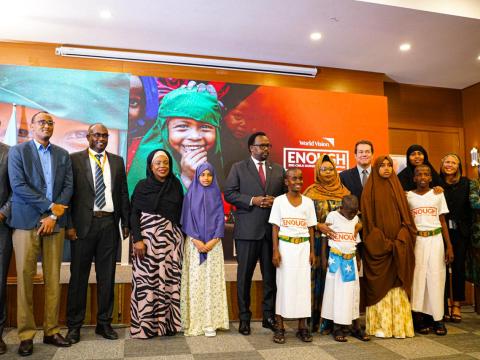Remarks delivered by Kevin Mackey, World Vision Somalia Country Director, during the ENOUGH Campaign Launch in Mogadishu, Somalia

Your Excellency Salah Jama, the Deputy Prime Minister of the Federal Republic of Somalia; Your Excellency Dr. Ali Haji, the Minister of Health and Human Service of the Federal Republic of Somalia; Your Excellency Deputy Minister of Agriculture and Irrigation, Hon. Zahra Yusuf Igeh; Your Excellency Deputy Minister of Communications, Hon. Ahmed Diriye; Your Excellency Deputy Commissioner of the Somali Disaster Management Agency, Dr. Ahmed Abdi Aden; Your Excellency Hon. Hawo Sokor Ali, Chair of the Parliamentary Committee on Human Rights, Women & Humanitarian Affairs at the Somali Federal Parliament House of the People, Distinguished members of parliament.
Lillian Dodzo, East Africa Regional Leader of World Vision, Director generals of the Ministries of Labour and Social Affairs (MoLSA) and Agriculture, Child rights advocates, Our children, UN partners OCHA, WFP, UNICEF and FAO, Civil society organizations, local and national non-governmental actors, and finally our donors, whose generosity enables much of what are currently doing and what we can do moving forward.
All protocols observed.
The Enough Campaign is World Vision’s effort to mobilise our humanitarian and development partners and peers’ collective voice against child hunger and malnutrition.
We recognize the task of ending child malnutrition is the work of many hands. World Vision believes that it takes a comprehensive approach to end hunger and malnutrition in Somalia.
We understand that the task before us is a difficult one. There are an estimated 1.7 million children aged 6 to 59 months who face acute malnutrition, including 430,000 who are likely to be severely malnourished. We believe this is unacceptable.
Today, we hope to unpack the reasons for these stark numbers to understand the technical and structural issues which lead to them. We hope to explore how conflict and the impacts of climate change are making it harder for families to secure enough food. We will listen to Somali children to understand how food insecurity impacts their health, families, and their prospects for the future.
World Vision has been at the forefront of humanitarian, development, and peace programming in Somalia since 1993, working in hard-to-reach locations with our government and local partners and addressing the underlying causes of poverty to lift vulnerable households out of hunger and malnutrition. Currently, World Vision supports 266 health and nutrition sites to reaches over one 1 million Somali children with nutrition and food security programs.
To address hunger in Somalia, we strengthen livelihoods, promote access to markets and financial services, increase access to health, nutrition, water, protection and education services. We also work closely with the government and civil society to lead development, and advocate for policies that support sustainable development, inclusive governance and continued access to services for children.
In this room, are assembled many of the people who are best-placed to take action to ensure that every child enjoys enough nourishing food so that they can thrive.
And as such---we will also look at opportunities to improve the situation. In the immediate term, how we can effectively mobilise our networks of supporters to raise public awareness to the need for humanitarian assistance, ensuring that there is enough food available for the food insecure. Despite funding constraints and scaling down, humanitarian assistance has continued to play a critical role in preventing the worsening of food security and nutrition outcomes in Somalia. However, high levels of food insecurity and acute malnutrition will persist through at least mid-2025 if additional funding is not secured to scale up and sustain humanitarian assistance to address hunger.
With an eye to the future, we will explore how through policy, advocacy, and influence and the promotion of better farming practice, new infrastructure investments and stronger markets, we can tap the full potential of the country’s estimated 8.9 million hectares of irrigatable land, rich coastal resources and sustainably manage the country’s rangeland resources, which is the foundation of the livestock sector and a large proportion of the economy.
There is also high potential to leverage the rich soils, particularly in the riverine areas coupled with warm temperatures, to support the year-round production of cereals, pulses, vegetables, and fruit, among other agricultural products.
In Somalia, children are continuing to bear the brunt of an unequal food system disrupted by conflicts and climate change. Every child deserves the food they need to develop a healthy body and mind. Every family has the right to be able to put enough of the right food on the table. World Vision cannot end hunger and malnutrition alone in Somalia and we look forward to our valued partnership with all of you to address these challenges.
Your presence and support are invaluable in our collective efforts to address the critical issue of child hunger and malnutrition in Somalia. Together, we can make a significant and lasting impact on the lives of the children and families in need. Thank you all for being here today.
Let us now begin the launch of this important campaign.